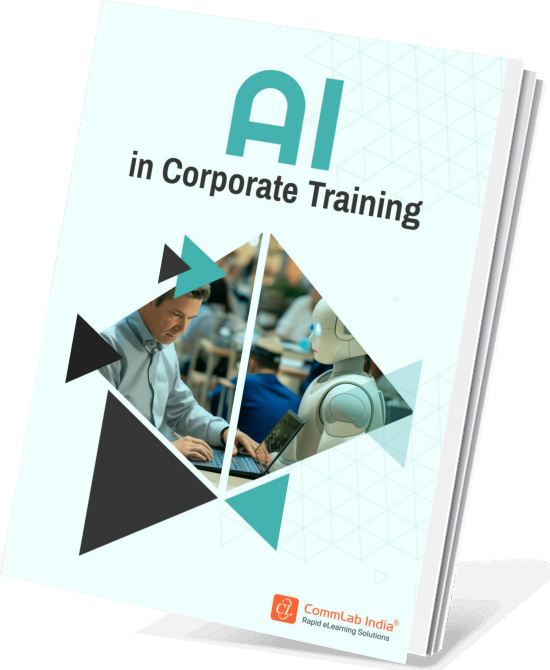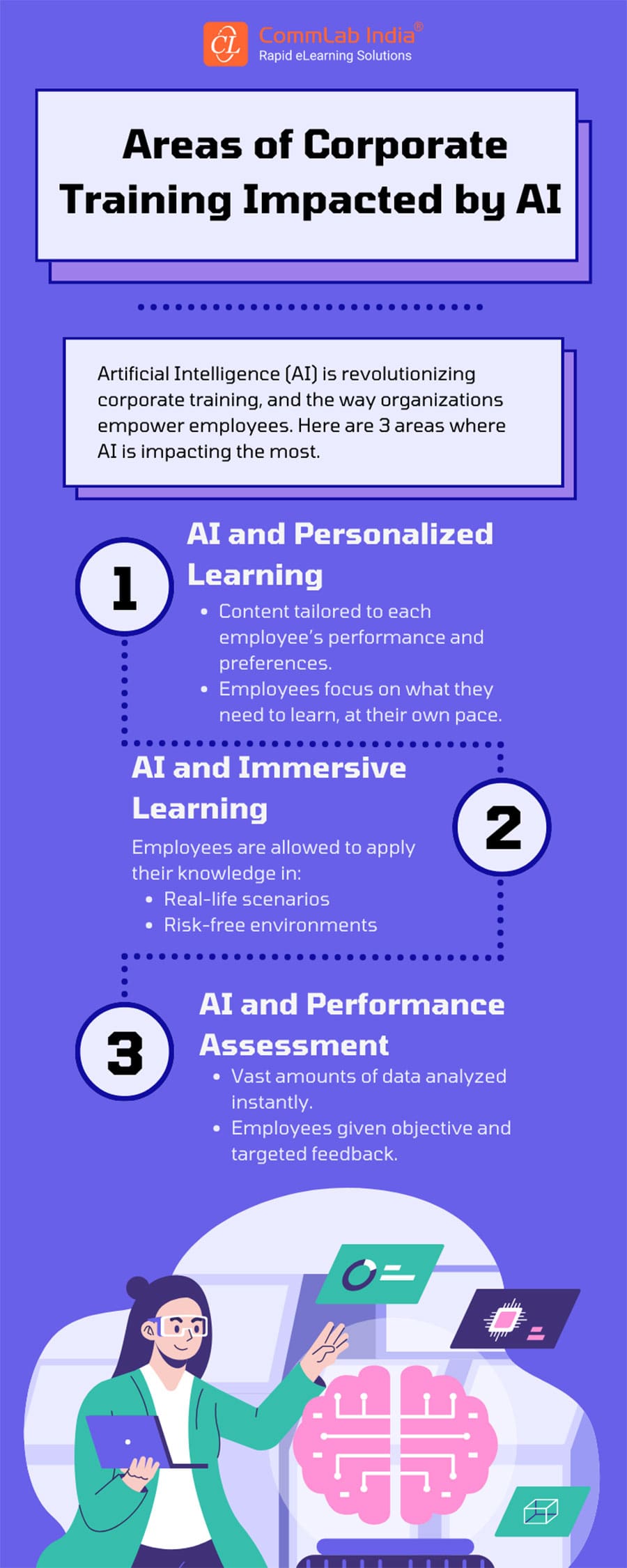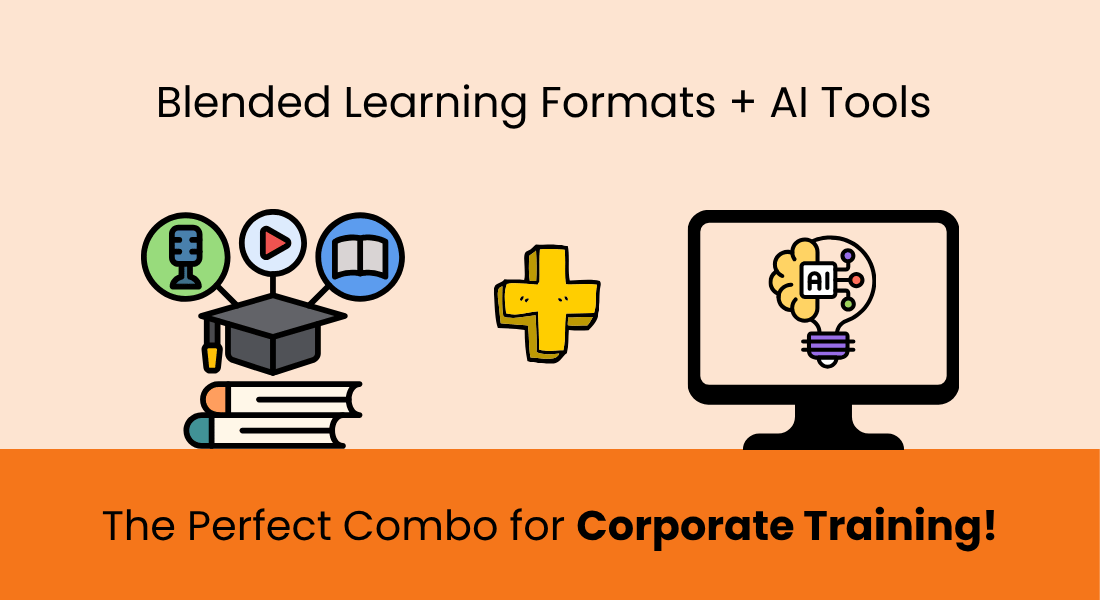AI Meets Corporate Learning: The Personalized Path to Success

Imagine a learning path designed just for you, where every step is tailored to your pace, your strengths, and your weaknesses. That’s what AI-driven personalized learning is offering corporate learners today. As businesses become more globally competitive, the need for effective, efficient training solutions has never been greater.
Traditional “one-size-fits-all” training approaches are quickly being replaced by dynamic, customized learning paths, thanks to artificial intelligence (AI). This approach promises not only to optimize employee engagement but to streamline the skill-building process and enhance overall performance in a scalable, measurable way.
→ Download eBook: AI in Corporate Training
What are Personalized Learning Paths?
Personalized learning paths provide individual employees with tailored content, assignments, and assessments that best suit their unique needs, goals, and learning styles. These paths are designed to adapt over time, responding to a learner’s progress and challenges.
In a corporate context, personalized learning paths mean employees can focus on gaining the skills most relevant to their roles, helping them become more effective contributors to the business.
For instance, a customer service agent might be presented with learning modules focused on problem-solving and communication skills, while a marketing specialist could receive more content on data analytics and social media strategy.
Personalized learning paths help each employee get exactly what they need to excel in their specific role, maximizing both personal and organizational growth.
Benefits of AI-Driven Personalized Learning Paths for L&D Teams
- Increased learner engagement and retention
- Scalability and efficiency
- Data-driven insights
- Cost-effectiveness
How AI Customizes Learning Experiences
AI’s primary role in creating personalized learning paths is to analyze data from the learner's interactions—such as quiz scores, content completion rates, and even preferred learning formats (like video or text)—and use this information to tailor the learning journey.
AI accomplishes this through:
- Learning Preferences – AI algorithms assess each employee’s learning style and suggest formats (e.g., video, text, quizzes) that suit them best.
- Skill Gaps and Progress Tracking – Based on assessments, AI can identify areas where an employee may need additional training, adjusting the learning path accordingly.
- Adaptive Content Delivery – If a learner struggles with a particular concept, AI might revisit it with additional resources or present it in an alternative format.
By adapting in real time, AI-driven platforms create a dynamic learning environment, promoting a more effective, engaging experience for corporate learners. This customization can drastically reduce the time it takes for employees to master new skills or knowledge, making them more productive sooner.
Benefits for Corporate L&D Teams
AI-driven personalized learning is not only beneficial for employees; it’s a game-changer for corporate L&D teams. Some key advantages include:
Increased Engagement and Retention
By delivering content that feels relevant and directly applicable, personalized learning paths make training more engaging. Employees are more likely to stay engaged and complete their learning paths when the content resonates with them.
Scalability and Efficiency
AI can manage learning paths for thousands of employees simultaneously, adapting each one to the individual without the need for constant L&D intervention. This is especially useful for global companies with diverse teams, as it provides a scalable solution that addresses individual needs on a large scale.
Data-Driven Insights
L&D teams gain access to data on individual and team progress, common knowledge gaps, and course completion rates. This information allows for a more strategic approach to content creation and deployment, ensuring that training resources are used effectively.
Cost-Effectiveness
By focusing resources on areas of need, companies can reduce costs associated with generalized training programs. Employees also become proficient faster, helping businesses stay competitive with a more skilled workforce.
Real-World Applications of AI-Driven Personalized Learning
AI-driven personalized learning is already making a tangible impact in organizations around the world. Some examples include:
Salesforce: This global tech company uses AI to provide personalized training paths based on job roles and skill gaps. By doing so, they ensure employees are up to speed with industry developments, enabling them to provide the best support to clients. Read more here.
Unilever: Unilever leverages AI to develop custom learning journeys, focusing on both soft and technical skills. AI identifies and delivers content that aligns with each employee’s career aspirations and skill gaps, making learning more targeted and impactful. Read more here.
PwC: The consulting giant uses AI to offer customized learning paths focused on data analytics and digital skills. This ensures that PwC consultants are equipped to serve clients in today’s digital-first world, where technology skills are in high demand. Read more here.
Each of these companies exemplifies how AI-driven personalized learning can be strategically applied to meet specific corporate goals while enhancing employee engagement.

AI in Corporate Training
Partner, Not Replacement
- AI in Corporate Training
- AI Toolkit for Super-charged Learning
- Challenges to Consider with AI Implementation
- And More!
Future Trends in AI-Driven Learning
AI-driven personalized learning continues to evolve, with current developments setting the stage for even more sophisticated applications. Here are a few trends to keep an eye on:
Adaptive Assessments
Traditional assessments are being replaced by adaptive tests, which adjust in real time, based on the learner’s responses. This makes it possible to measure skills more accurately and provide learners with immediate, relevant feedback.
AI-Enhanced Content Creation
AI is beginning to aid in creating learning materials, from short quizzes to entire eLearning modules, based on the needs of individual learners. This trend will make personalized content creation faster and more efficient.
Predictive Learning Analytics
By analyzing historical data, AI can predict which employees may struggle with specific skills and proactively suggest training. This helps L&D teams take a proactive approach to training, reducing potential performance issues down the line.
Emphasis on Soft Skills
AI-driven platforms are expanding their focus beyond technical skills, recognizing the importance of soft skills in today’s collaborative work environments. Personalizing training paths for communication, empathy, and resilience is becoming a priority.
These trends demonstrate that AI will continue to shape L&D in increasingly innovative ways, focusing on refining personalized learning experiences for employees worldwide.
Case Studies: Companies Leading the Way in DEI Training
Some forward-thinking companies are leveraging AI-driven personalized learning to foster more inclusive workplaces, particularly through Diversity, Equity, and Inclusion (DEI) training. Here are a few brief examples:
IBM: IBM has incorporated AI to develop individualized DEI training paths, ensuring that employees receive content tailored to their cultural understanding and regional contexts.
Accenture: Through AI-driven DEI modules, Accenture personalizes training to address unconscious biases, aiming to create a more inclusive workplace culture
Coca-Cola: The beverage giant uses AI to provide DEI training specific to roles and regions, helping employees engage with DEI content that is relevant to their everyday experiences and responsibilities.
These examples showcase how AI can support not only technical skill development but also create inclusive work cultures by addressing diverse learning needs and backgrounds.
Steps to Get Started with AI-Powered Learning Paths
1. Use ChatGPT for tailored content
2. Leverage existing LMS for adaptive content pathways
3. Use ChatGPT as a virtual tutor or FAQ resource
4. Pilot a personalized learning track with manual adjustments
5. Gather analytics and feedback
6. Simulate adaptive learning with ChatGPT’s content variability
Getting Started with AI-Powered Personalized Learning Paths
For L&D teams looking to ease into AI-driven personalized learning without investing in new tools right away, here are practical steps to implement personalization using current learning management system (LMS) infrastructure and tools such as ChatGPT.
Experiment with ChatGPT for Tailored Content
Start by using ChatGPT, in both its free and paid versions, to generate tailored learning materials. You can create customized quiz questions, short modules, and interactive scenarios by prompting ChatGPT with specific instructions based on team skill levels and job roles. This gives employees a taste of AI-personalized learning without a full AI platform.
Leverage Existing LMS for Adaptive Content Pathways
Many modern LMS platforms allow you to create “rules-based” pathways, which can mimic the adaptability of AI by directing learners to different resources based on their progress. Use completion rules to guide learners to supplementary content if they score below a threshold on an assessment, for example, or to advanced material if they show high proficiency.
Use ChatGPT as a Virtual Tutor or FAQ Resource
ChatGPT can function as a “virtual tutor,” answering common questions or providing additional information on training topics. Encourage employees to interact with it as a way to explore content more deeply. This creates an interactive experience and can help bridge knowledge gaps in real-time, similar to AI-driven tutoring.
Pilot a Personalized Learning Track with Manual Adjustments
Select a small group of employees to pilot a “personalized” learning experience. Begin by assessing their knowledge and skills through quizzes or self-assessments on your LMS. Use ChatGPT to develop custom content based on their needs and track progress through your LMS. Make manual adjustments to the learning path based on their feedback and performance data to emulate an AI-driven journey.

AI in Corporate Training
Partner, Not Replacement
- AI in Corporate Training
- AI Toolkit for Super-charged Learning
- Challenges to Consider with AI Implementation
- And More!
Gather Analytics and Feedback
Most LMSs offer analytics on user activity, engagement, and completion rates. Review this data to understand which content is most effective and where learners struggle. Combined with qualitative feedback from employees, these insights can guide future AI implementations, helping you see where automation could make the most impact.
Simulate Adaptive Learning with ChatGPT’s Content Variability
Create multiple versions of content on key topics by prompting ChatGPT to generate explanations, scenarios, or examples with slight variations. Assign different versions to employees based on their job functions, interests, or skill levels. This can serve as a basic form of adaptive learning that gives employees a taste of a personalized experience.
By leveraging these accessible tools and LMS features, you can explore AI-enhanced learning on a smaller scale. This gives your organization the flexibility to experience the benefits of AI-driven personalization and gather insights that will inform more extensive implementations down the line.
AI-driven personalized learning paths represent a significant shift in how corporate training is approached. They empower employees to learn at their own pace, tailor content to meet specific needs, and ensure that skills remain relevant in an ever-evolving workplace. For L&D professionals, this technology offers an exciting opportunity to maximize the impact of training programs while staying aligned with business goals.




![Learning Design Strategies for Mobile Learning – An Overview [Infographic]](https://blog.commlabindia.com/hubfs/blogs/mobile-learning-design-strategies-infographic.jpg)

![Learning Management System— Deep Dive into Benefits and Features [Infographic]](https://blog.commlabindia.com/hubfs/blogs/learning-management-system-features-infographic.jpg)